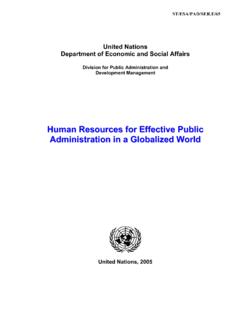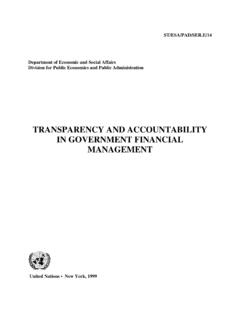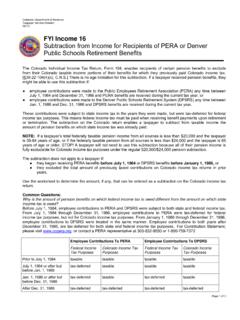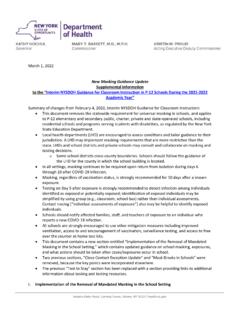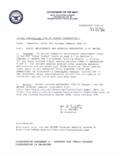Transcription of EXCELLENCE AND LEADERSHIP IN THE PUBLIC SECTOR: THE …
1 ST/ESA/ Nations Department of Economic and Social AffairsandInternational Association of Schools and Institutes of AdministrationEXCELLENCE AND LEADERSHIP IN THE PUBLIC SECTOR: THE ROLE OF EDUCATION AND TRAINING7th Global Forum on Reinventing GovernmentBuilding Trust in Government26-29 June 2007, Vienna, AustriaUnited NationsNew York, 2007 DESA MISSION STATEMENTThe Department of Economic and Social Affairs of the United Nations Secretariat is a vital interface between global policies in the economic, social and environment spheres and national action. The Department works in three main interlinked areas: (i) it compiles, gener-ates and analyses a wide range of economic, social and environmental data and information on which Member States of the United Nations draw to review common problems and to take stock of policy options; (ii) it facilitates the negotiations of Member States in many intergovernmental bodies on joint courses of action to address ongoing or emerging global challenges; and (iii) it advises interested governments on the ways and means of translating policy frameworks developed in United Nations conferences and summits into programmes at the country level and, through technical assistance, helps build national capacities.
2 NOTEThe designations employed and the presentation of the material in this publication do not imply the expression of any opinion whatsoever on the part of the Secretariat of the United Nations concerning the legal status of any country, territory, city or area, or of its authorities, or concerning the delimitation of its frontiers or boundaries. The designations developed and developing economies are intended for statistical con-venience and do not necessarily imply a judgment about the stage reached by a particular country or area in the development process. The term country as used in the text of this publication also refers, as appropriate, to territories or areas. The term dollar normally refers to the United States dollar ($).The views expressed are those of the individual authors and do not imply any expression of opinion on the part of the United United Nations PublicationPublication No.
3 : ST/ESA/ in Austria2007 Copyright United Nations, 2007 All rights reservedAcknowledgementsThe Division for PUBLIC Administration and Development Management of the United Nations Department of Economic and Social Affairs has been engaged in a multiyear joint initiative with the International Association of Schools and Institutes of Administration (IASIA) on enhancing the quality of governmental LEADERSHIP and the EXCELLENCE of PUBLIC administration education and training. Towards this end, the United Nations has sponsored, in conjunction with IASIA, meetings on these subjects in Rio de Janeiro, Brasil and Kampala, Uganda. The Initial versions of the papers included in this book were presented during these meetings and this publication was sponsored by the United Nations. The Institute for PUBLIC Management and Community Services of Florida International University provided assistance to the United Nations and IASIA in the preparation of this volume, which is one of the Government Reinvention Series published on the occasion of the 7th Global Forum on Reinventing for PUBLIC Administration and Development Management, United Nations Department of Economic and Social Affairs, New York, USA Web Site: International Association of Schools and Institutes of Administration, Brussels, Belgium Web Site: Editors.
4 Allan Rosenbaum, Director, Institute for PUBLIC Management and Community Services, Florida International University, Miami, Kauzya, Chief, Governance and PUBLIC Administration Branch, Divi-sion for PUBLIC Administration and Development Management, United Nations, New York, New YorkThe Government Reinvention Series Editor:G. Shabbir Cheema, Principal Advisor on Governance, Division for PUBLIC Ad-ministration and Development Management, Department of Economic and Social Affairs, United Rosenbaum and John-Mary Kauzya ..viiStrengthening PUBLIC Sector Capacity for Achieving the Millennium Development GoalsGuido Bertucci ..1I Enhancing the Quality of Education and Training for the PUBLIC SectorExcellence in PUBLIC Administration Education: Preparing the Next Generation of PUBLIC Administrators for a Changing WorldAllan Rosenbaum.
5 11 The Management Competencies of Senior Managers: A Look at Some OECD CountriesMohamed Charih, Jacques Bourgault, Daniel Maltais and Lucie Rouillard ..25 High Performing Schools and Institutes of Administration: The Role of Standards of ExcellenceBlue Wooldridge ..44 Enhancing the Quality of a PUBLIC Administration Training Plan through Knowledge ManagementShih-Hsien Chang ..62 Providing Support for Senior PUBLIC Officials: The Role of Professional AssociationsMichael Brintnall ..76 PUBLIC Administration Education and Training in South Africa: New Needs and the Implementation of New ApproachesHendri Kroukamp ..86 Enhancing the Quality of PUBLIC Administration Education: The Case of IndiaR. K. Mishra ..96 The United Arab Emirates Experience in Developing Standards of EXCELLENCE in PUBLIC Sector Education & TrainingYousuf Essa bin Hassan Al Sabri.
6 108II Enhancing LEADERSHIP Capacity Through Education and Training: An African PerspectiveA LEADERSHIP Capacity Enhancement Initiative for the African ContinentJohn-Mary Kauzya ..115 Analyzing the LEADERSHIP Capacity Challenge: Towards Potential Intervention StrategiesPatrick Fitzgerald ..123 The Role of PUBLIC Sector LEADERSHIP in Fostering Socio-Economic and Political Development in AfricaTag Elsir Mahgoub Ali ..131 LEADERSHIP Challenges in Mainstreaming Performance Enhancement in the PUBLIC ServiceJohn Kiyaga-Nsubuga ..142 LEADERSHIP for Reform and Modernization of GovernanceOusmane Batoko ..149 III Concluding CommentsPublic Sector LEADERSHIP Capacity Building Through Education and TrainingTurgay Ergun ..157viiIntroductionAllan Rosenbaum and John-Mary Kauzya *The volume that follows deals with two separate but very closely related issues that, when taken together, will have a profound impact on the quality of governance of the world s nations during the next several decades.
7 These two topics are how one best achieves true EXCELLENCE in PUBLIC administration education and training and how one prepares both the current and the next generation of governmental LEADERSHIP to most effectively deal with the complex problems which the world s nations face. Clearly, these are issues that are highly interrelated. While it s true that no doubt some leaders are, in fact, born, not made, it is equally true that the quality of LEADERSHIP found in any government can be significantly enhanced by effective education and training. Such efforts will focus not only on leader-ship techniques, but also will provide governmental leaders both political and administrative with a broader understanding of the critical issues with which all governments are increasingly having to question of how one best achieves EXCELLENCE in PUBLIC administration education and training is certainly not a new one.
8 Most assuredly, it has been a concern of those involved in the preparing of PUBLIC administrators ever since PUBLIC administration education emerged as a distinct academic discipline, now nearly a century ago. Nevertheless, it is an issue that is being addressed with increasing frequency both by individuals and institutions in the field, and by the growing number of international associations in the field and especially those associa-tions that have schools and institutes of PUBLIC administration as their principal Administration in a Complex EnvironmentWhile the questions of how to improve governmental LEADERSHIP and how to achieve EXCELLENCE in PUBLIC administration education are perennial ones, this is a particularly appropriate time to reconsider them for at least two reasons. First, and most important, is the reality that the tasks faced by PUBLIC administrators in today s world are becoming ever more complex.
9 Every day, PUBLIC administrators are being challenged to solve problems that range from the technologically highly complex (addressing issues like global warming and the protection of the environ-ment) to such highly ideologically charged issues as promoting a society s economic wellbeing and addressing its problems of crime and delinquency. Indeed, what are perhaps the two most pressing crises currently facing democratic governments the world s growing inequality and the resultant inability to more effectively address * Allan Rosenbaum is Director of the School of Urban and PUBLIC Affairs and the Institute for PUBLIC Management and Community Service and Professor of PUBLIC Administration at Florida Interna-tional University, Miami, Florida, and John-Mary Kauzya is Chief of the Governance and PUBLIC Administration Branch, Division for PUBLIC Administration and Development Management, Department of Economic and Social Affairs, United Nationsviii EXCELLENCE and LEADERSHIP in the PUBLIC Sector: The Role of Education of widespread poverty and the threat of terrorism will require the most skilled of PUBLIC administrators.
10 They will also require new and creative LEADERSHIP on the part of both government officials and PUBLIC the United Nations has recently noted, the wealthiest 20 per cent of the world s population receives 80 per cent of the world s annual income. Approximately half the world s population, nearly three billion people, live in a state of poverty on an income of less than $ a day. Two billion people lack clean water. Eight hundred million people are seriously affected by hunger. Five hundred thousand mothers die each year in childbirth. Clearly one of the great challenges of the next decade is going to be how the governments of countries around the world address these critical problems. This is going to require the development of highly skilled government administrators who have received the most excellent possible education and , the issue of terrorism is providing the PUBLIC sector with new, dif-ferent and perplexing challenges.

